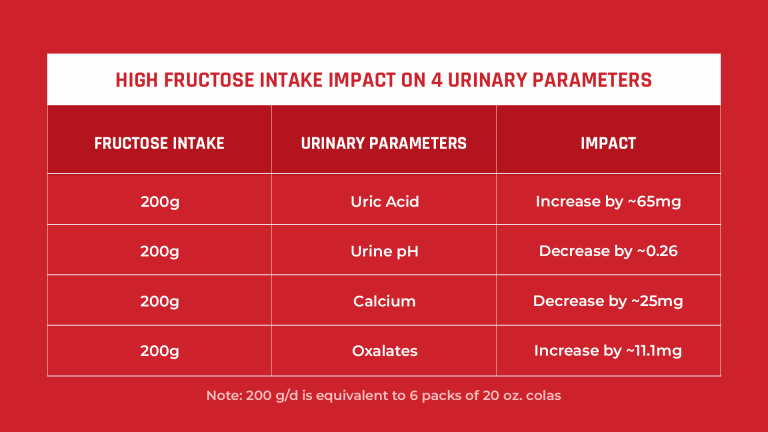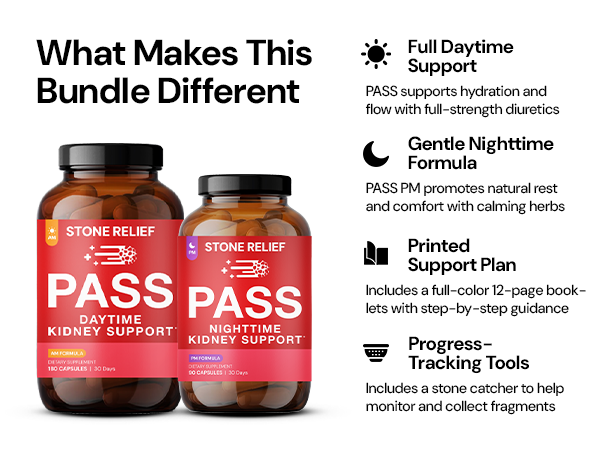Sugar and Kidney Stones: What You Need to Know
Sugar often gets blamed for causing kidney stones, but the truth is more complex. In this blog, I’ll explain the real relationship between sugar and kidney stones, including how it impacts uric acid and calcium oxalate stones. You’ll also learn when sugar could actually pose a real risk—and when it likely doesn’t.
Key Takeaways
-
Excess sugar intake can increase the risk of uric acid stones by affecting uric acid levels and urine pH.
-
Metabolic health plays a major role in how sugar impacts kidney stone formation.
-
Sugar has little to no proven effect on calcium oxalate kidney stones.
-
Cutting sugar is helpful, but fixing overall diet and metabolic health is even more critical.
When it comes to kidney stones, sugar is often painted as the enemy.
But is it really to blame?
Today, I want to dig deep into the relationship between sugar and kidney stones to help clear up a lot of confusion.
Every week, I talk to hundreds of kidney stone sufferers.
An overwhelming number have been told that sugar is causing their kidney stones.
While I’m no fan of processed sugar, I don’t believe all sugars, especially those found in fruit, are behind the epidemic of stones we’re seeing.
However, it’s tough to ignore the data.
Sugar consumption in America is at an all-time high, with the average person eating about 126 grams a day—around a quarter of a pound.
At the same time, kidney stone cases are rising too.
So, let’s break down if sugar is truly the problem.

How Sugar Impacts Uric Acid Kidney Stones
First, let’s talk about the kidney stone type that is most impacted by sugar—uric acid stones.
To form uric acid stones, two things need to happen:
-
Elevated uric acid levels in your blood
-
A consistently acidic urine pH
So how does sugar fit in?
Healthy adults usually have serum uric acid levels between 2.6 and 7 mg/dL.
When sugar intake goes up—especially fructose—serum uric acid levels can rise too.
One study showed that when participants consumed 200 grams of fructose daily, their serum uric acid levels rose by about 1.01 mg/dL.
That’s a significant 25% increase based on the normal range.
However, that’s an extreme amount of sugar—most Americans consume around 126 grams daily.
Still, sugar doesn’t just mess with uric acid.
It also lowers urine pH, making the environment more favorable for uric acid stones.
In the same study, consuming 200 grams of fructose dropped urine pH by around 0.26–0.61 points.
That might not sound like much, but even a half-point shift in pH is huge for stone formation.
🛒 Check Price & Purchase Stone Relief Pass AM/PM Bundle on Amazon
The Deeper Problem: Metabolic Health and Insulin Resistance
Beyond just uric acid and pH, sugar also wreaks havoc on insulin signaling.
High sugar intake can lead to insulin resistance, which affects how the kidneys function.
When insulin resistance sets in, it impacts something called the proximal tubule in your kidneys.
This disrupts ammonium production, which your body relies on to maintain a balanced pH.
With less ammonium, your urine becomes more acidic—perfect for forming uric acid stones.
The bottom line:
If you’re metabolically unhealthy, eating high amounts of sugar can significantly raise your risk for uric acid kidney stones.
🛒 Check Price & Purchase Stone Relief Pass AM/PM Bundle on Amazon
When Sugar Isn't the Villain: My Take
If you’re metabolically healthy, the picture is different.
You can likely tolerate normal amounts of sugar—especially from whole fruits—without a big concern for kidney stones.
Personally, I experimented for a year eating around 100 grams of fruit sugar daily.
As a metabolically healthy individual, I didn’t see any negative changes in my labs or develop any new stones.
So, if your insulin signaling is intact and you’re eating mostly natural, unprocessed sugars, you’re likely okay.
Sugar and Calcium Oxalate Kidney Stones
Now, what about calcium oxalate stones—the most common type of kidney stone?
Roughly 80% of stones fall into this category.
There’s a lot of misinformation online saying that sugar causes these stones too.
Here’s the truth:
Some studies suggest that fructose consumption might slightly increase calcium excretion in the urine.
However, calcium alone doesn’t cause kidney stones.
You need calcium to meet oxalate in order for a stone to form.
If your diet is low in oxalate (which it should be if you’re managing kidney stones properly), this isn’t a risk.
Increased calcium excretion without oxalate simply doesn’t matter.
On top of that, the evidence tying sugar to increased oxalate production is weak and insignificant.
Unless you have a rare condition like primary hyperoxaluria, your body isn’t making dangerous amounts of oxalate just from sugar intake
So, does sugar cause calcium oxalate stones?
No, it does not.
🛒 Check Price & Purchase Stone Relief Pass AM/PM Bundle on Amazon
Final Thoughts: What This Means for You
If you’re battling uric acid stones and you’re metabolically unhealthy, it’s a smart move to cut back on sugar.
If you’re dealing with calcium oxalate stones, sugar isn’t the real villain.
The bigger focus should be on fixing your diet, addressing metabolic health, and avoiding high-oxalate foods.
Sugar might not be ideal for your health in general, but for calcium oxalate kidney stones, it’s not the smoking gun.
If you’ve been feeling overwhelmed by conflicting advice, I get it.
I was there too a decade ago, trying to figure all of this out.
That’s why it’s so important to work with someone who’s been through it—and come out the other side stronger.








